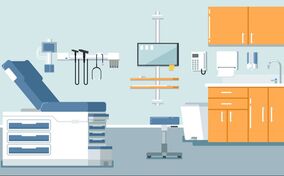What to Expect in CBT Treatment Series: Health AnxietyWritten by: Dr. Hillary Gorin, PhD, LCPThis blog series will help you understand what to expect in Cognitive Behavioral Treatment (CBT) for a variety of different anxiety disorders, OCD, and PTSD. No matter what you are seeking help for, it can be very scary to start treatment. I assume most of my patients enter their first appointment with me with anxiety. I assume this for several reasons. 1. You are taking a big first step in your life to change something that may feel impossible to change; 2. Most of my patients experience an abundance of anxiety on a daily basis and new experiences make us all feel anxiety.
My hope is that this blog series helps you to have a better sense of what to expect in your treatment if you choose exposure-based CBT interventions. First and foremost, the first appointment will be a lot of data collection. In order to determine how I can be helpful, I must determine what your problem looks like. You can plan on me asking you a ton of questions. My goal is to determine what diagnoses you meet criteria for (to ensure I can treat those diagnoses) and to instill some hope in you that I can help you. Just like we would hope our doctors would evaluate what is broken before treating a broken bone and then tell us how they can be helpful, I want to use a scientific approach in my practice and give you some hope that the science works. Although a one size fits all approach does not work for everyone, I apply all evidence-based techniques or techniques that have been supported by ongoing research. In this series, you will find the general what’s and why’s of treatment with me. Also, if you are struggling with the motivation to get started, I include some information on why it may be worth it to take a chance on this treatment. Health Anxiety Treatment What is Health Anxiety? Health anxiety (or Illness Anxiety Disorder) is anxiety about your health (simply put). It involves a fear of getting or having a serious illness. This anxiety often drives patients to either repeatedly check their bodies for health or illness or avoiding evaluating their health, as seen by avoiding doctor appointments all together (Abramowitz & Braddock, 2011). Recently, I have seen specific COVID-19 related anxiety which similarly presents as anxiety about acquiring, having, or contracting COVID-19. What will we work on?
Why Engage in this Treatment? Consider the ways your life has been negatively impacted by your health anxiety (Grayson, 2014). Can you prevent medical problems by thinking about them or researching them? Does your medical anxiety impact your ability to care for yourself, to go to your appointments, to manage the COVID-19 pandemic? Does it impact your ability to enjoy your life? If so, you may want to give treatment a try. Why this treatment works? We can’t predict the occurrence of medical problems, for the most part. However, what I can predict is your ability to learn to tolerate this reality. We all will face medical problems at some point. By facing this fear, we can stop thinking about this reality and start living in our present reality again. References Abramowitz, J. S. & Braddock, A. E. (2011). Hypochondriasis and Health Anxiety: Advances in Psychotherapy Evidence-Based Practice. Hogrefe. American Psychiatric Association. (2013). Diagnostic and statistical manual of mental disorders (5th ed.). https://doi.org/10.1176/appi.books.9780890425596 Grayson, J. G. (2014). Freedom from Obsessive-Compulsive Disorder: A personalized recovery program for living with uncertainty. Berkley Books. Comments are closed.
|
OakHeart
|
- Home
- Counseling
-
Specialties
- Depression
- Bipolar Disorder
- Anxiety Disorders >
- Obsessive-Compulsive Disorder (OCD)
- Eating Disorders
- Grief and Bereavement
- ADHD
- Maternal Mental Health
- Infertility, Miscarriage, and Neonatal Loss
- Domestic Violence and Sexual Assault
- Posttraumatic Stress Disorder (PTSD) >
- Trauma
- Non-Suicidal Self-Injury (NSSI)
- Substance Use Disorders (SUD)
- Anger Management
- Insomnia
- Divorce Recovery
- Relationship Concerns and Couples Counseling
- Self-Esteem
- Therapy for Therapists
- LGBTQA+ Support
- Faith-Based Counseling
-
Providers
- Erin Mitchell
- Pamela Heilman
- Katie Sheehan
- Hillary Gorin
- Lee Ann Heathcoat
- Adam Ginsburg
- Megan Noren
- Sarah Williams
- Christina Bieche
- Bridgette Koukos
- Laura Lahay
- Kate Nash
- Anna Perkowski
- Alma Lazaro
- Leah Arthur
- Marissa Vogrin
- Erin Blair
- Amy Jakobsen
- Lizzy Lowe
- Tony Fasano
- Gerry Lawm
- Vanessa Osmer
- Kat Harris
- Locations
- Contact
- Treatments
- Employment
- FAQ and Notices
- OakHeart Blog
- Administrative and Leadership Team
- Mental Health Resources
- Divorce Mediation
- Professional Consultation
|
|




